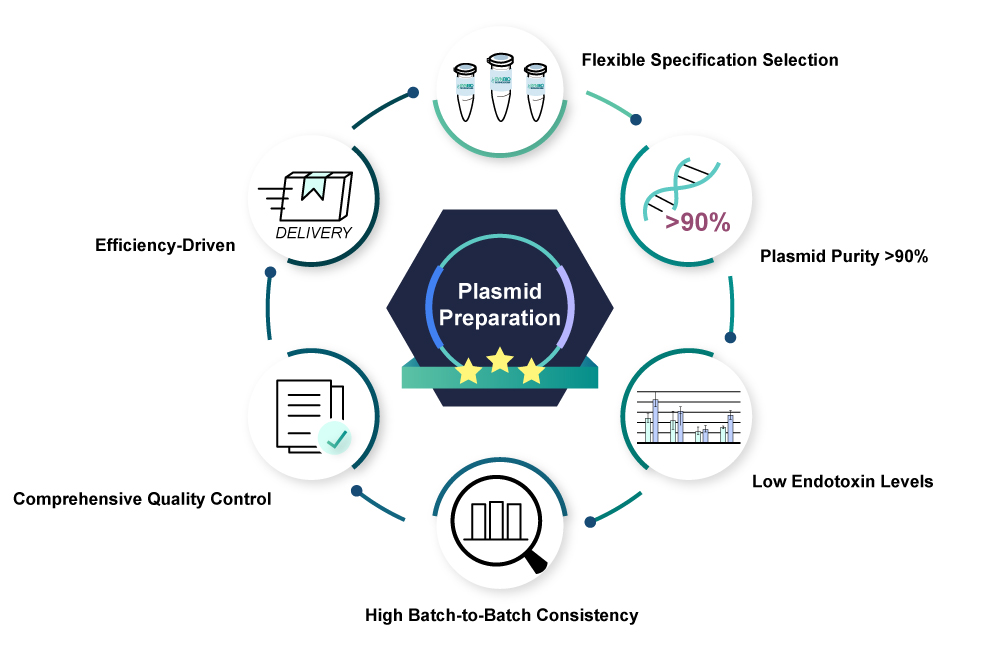The quality of the plasmid prep can make the difference between success and failure in the world of Molecular Biology. The preparation of plasmids is more than just a lab step. It's the basis for everything that comes after. A high-quality preparation of plasmids is essential for achieving consistent and reliable results in research, whether it's drug development or genetic engineering. We'll examine what makes a reliable plasmid preparation and why each component is important for your experiments.
1. High Purity: Reducing Contaminants for Consistent Results
Purity is the benchmark for a quality plasmid preparation. Contaminants such as proteins, RNA and endotoxins, (such lipopolysaccharides or LPS), can affect results. They can impact everything from gene expression, to cell viability. Even small amounts of endotoxins, particularly in mammalian cell cultures, can cause data to be distorted or have adverse effects. To achieve a plasmid preparation that is compatible with high-stakes uses, effective endotoxin elimination steps and advanced purification methods are essential.
2. Plasmid Structural Integrity: Maintaining the Plasmid's Form and Function
Beyond purity, plasmid structure is a pillar of reliability. High-quality plasmids should retain their supercoiled structure, which protects against degradation and enhances uptake and expression in host cells. Supercoiling provides stability, while an intact sequence avoids the risk of unwanted insertions or deletions that could disrupt your experiment. Using high-quality reagents and careful handling during preparation helps maintain these qualities, preserving the plasmid’s intended functionality.
3. Stable Replication: Supporting Long-Term Experiments
Reliable plasmid prep doesn’t just work well on day one; it remains effective across repeated uses. This stability is essential for experiments that require consistent gene expression over time. By choosing plasmids with a strong origin of replication, researchers ensure that they’ll have sufficient copies for long-term studies. It’s about having confidence that the plasmid will continue to perform, even after multiple passages or large-scale amplifications.
4. Efficient Selection Markers: Simplifying the Screening Process
Selection markers are the unsung heroes of plasmid prep, enabling researchers to easily identify successfully transformed cells. Typically, plasmids contain antibiotic resistance genes or other selective markers that make it easy to screen out non-target cells. By adding antibiotics or selective agents to the culture, only cells containing the target plasmid will survive, saving valuable time in the lab. Choosing the right marker tailored to the host system ensures an efficient, seamless process.
5. Functional Components: Tailoring Plasmids to the Task
A high-quality plasmid doesn’t just contain DNA; it’s a carefully designed tool for specific applications. Functional components like promoters, terminators, and multiple cloning sites (MCS) ensure that the plasmid works seamlessly in its intended environment. Tailoring these elements to fit experimental needs—whether for high expression in mammalian systems or flexible cloning in bacteria—maximizes the plasmid’s effectiveness. The ability to customize functional components transforms plasmids from simple carriers to powerful, application-specific tools.
6. The Importance of Template Selection: Setting the Stage for Success
Choosing the right template type is crucial in PCR and digital PCR (dPCR) applications. Whether using genomic DNA (gDNA) for sample quantification or plasmid DNA (pDNA) for calibrating standard curves, template selection influences accuracy and consistency. Different templates may yield varying amplification efficiencies, so selecting the right one from the start helps ensure reliable, reproducible results.
7. Precision in Primer and Probe Design: Achieving Sensitivity and Specificity
Primer and probe design can be a make-or-break factor in plasmid prep. When designed well, primers and probes ensure high sensitivity and specificity, reducing the risk of non-specific amplification and false positives. This is especially important in low-copy samples where detection needs to be precise. With optimized primers and probes, researchers can trust that their amplification results are accurate, providing consistent insights across experimental applications.
Synbio Technologies | Plasmid DNA Preparation
Synbio Technologies provides high-quality, customized plasmid preparation services. We perform a comprehensive quality check on the plasmids to ensure that they are aseptic and contain no RNA or genomic pollution. All plasmids we manufacture are free of animal-derived materials and can contain low levels of endotoxin (< 100 EU/mg, <30 EU/mg, <5 EU/mg, on request). Our customers can choose between research-grade and transfection-grade plasmids.

High-quality plasmid preparation is more than a checklist; it’s an investment in the success of every experiment. By focusing on the key elements of purity, structural integrity and replication stability, as well as functional components, template design, primer design, selection markers and selection markers, researchers can push the limits of molecular biological research. Prioritizing quality from the very first step to the end result will help you achieve breakthroughs in synthetic biology, gene engineering and therapeutic development. A little extra care with plasmid preparation can lead to a lot of potential in the laboratory, and help you achieve your research goals.
References
Si, Nengwu, et al. "Effect of the matrix and target on the accurate quantification of genomic and plasmid DNA by digital polymerase chain reaction."Agriculture 13.1 (2023): 127.
 DNA Synthesis
DNA Synthesis Vector Selection
Vector Selection Molecular Biology
Molecular Biology Oligo Synthesis
Oligo Synthesis RNA Synthesis
RNA Synthesis Variant Libraries
Variant Libraries Genome KO Library
Genome KO Library Oligo Pools
Oligo Pools Virus Packaging
Virus Packaging Gene Editing
Gene Editing Protein Expression
Protein Expression Antibody Services
Antibody Services Peptide Services
Peptide Services DNA Data Storage
DNA Data Storage Standard Oligo
Standard Oligo Standard Genome KO Libraries
Standard Genome KO Libraries Standard Genome Editing Plasmid
Standard Genome Editing Plasmid ProXpress
ProXpress Protein Products
Protein Products
























